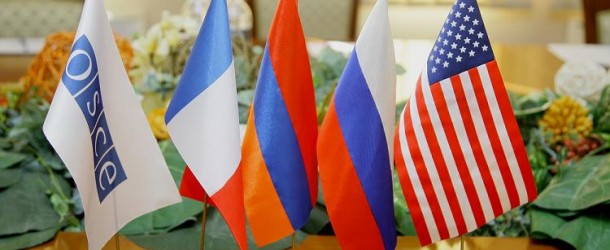According to the international practice, when countries cannot agree on the issues related to occupation, ethnic problems, border disputes and other matters, one or several impartial states can be designated as mediators for resolution of the outstanding issue. Examples are abundant.
Created in 1992, the Minsk Group of the Organization for Security and Cooperation in Europe was supposed to resolve the problem of occupation of Azerbaijan’s territory by Armenia. Yet for over 20 years now, the Minsk Group has struggled to propose to the parties any decent plan for peaceful resolution of the problem. The Minsk Group cannot even be credited with the signing of the ceasefire agreement in 1994.
Instead of reviewing its unsuccessful track record, reviving negotiations and producing new proposals package the Minsk Group displays jealousy towards other initiatives on the peaceful resolution of the problem of occupation of Azerbaijan’s lands by Armenia and aims to derail them. The Minks Group is either reluctant or incapable of resolving the problem it is tasked with and in the meantime, it opposes raising of this problem within different international institutions, let alone taking any concrete steps taken in that direction. Together with Armenia, the Minsk Group is even against discussion of this issue at the United Nations.
The Parliamentary Assembly of the Council of Europe (PACE) is one of political institutions that addresses the fact of the occupation of Azerbaijan’s territory by Armenia. Traditionally, the PACE demonstrates objective posture to the fact of occupation. PACE Rapporteur Robert Walter recently presented his report titled ‘Escalation of violence in Nagorno-Karabakh and other occupied territories of Azerbaijan’ during the organization’s winter session.
In a logic-defying move, the Minsk Group co-chairs issued a statement immediately prior to that saying that the latter was the only body mandated to resolve this problem. Indeed, it was a body established with the aim of solving this problem but this did not imply that the issue must not be raised at any other international organization or platform. The Minsk Group has been dragging its feet for the past 20 years, helpless in providing legal assessment when it comes to the occupying power and the victim of the occupation. Its policy is to essentially align itself with Armenia’s position rather than serve as honest broker.
Although a number of nations and international organizations have recognized the fact of the occupation of Azerbaijan’s territory by Armenia, the Minsk Group, for some reason, turns a blind eye on this reality and is busy protracting this issue instead of seeking its swift resolution. Such prejudiced attitude surely undermines Azerbaijan’s trust. Azerbaijan’s dismay regarding the performance of the co-chairs has been repeatedly voiced at the highest levels, stressing the option of substituting the co-chair nations.
Azerbaijan has rightfully demanded that the Minsk Group co-chair countries must ensure compliance with the UN Security Council resolutions and respective decisions of the Non-Aligned Movement, Organization of the Islamic Cooperation, as well as the PACE documents and decisions of the European Court of Human Rights that reflect the will of the international community.
Azerbaijan has not taken any obligations regarding the Nagorno Karabakh problem to be addressed solely within the Minsk Group and therefore, reserves all the rights to raise this issue at any international organization. Thus, effort by the Minsk Group to obstruct the discussion of this issue at the PACE is blatant violation of political norms and ethics and is totally incompressible and unacceptable.
Dr. Hatem CABBARLI

























































